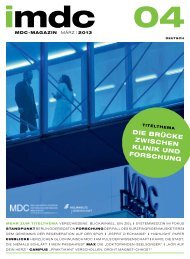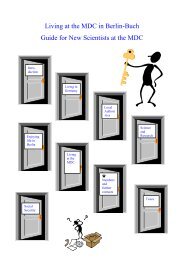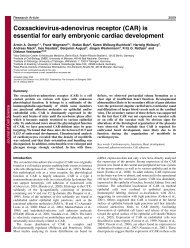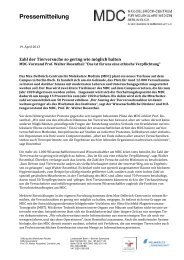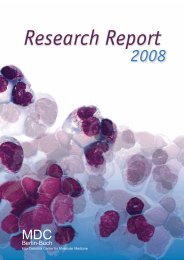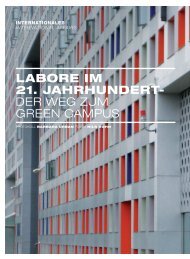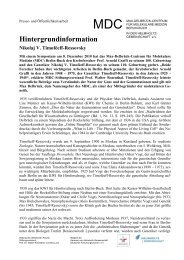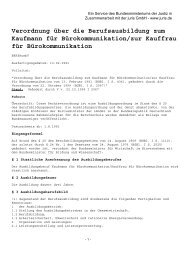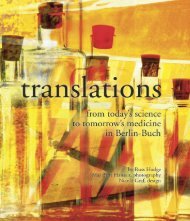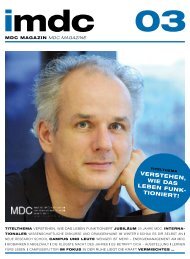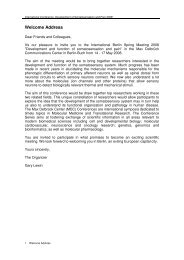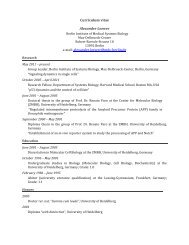iMDC03 zum Download (pdf)
iMDC03 zum Download (pdf)
iMDC03 zum Download (pdf)
Erfolgreiche ePaper selbst erstellen
Machen Sie aus Ihren PDF Publikationen ein blätterbares Flipbook mit unserer einzigartigen Google optimierten e-Paper Software.
AnniversarY<br />
20 Years of the MDC<br />
- A Chronology<br />
Part 1 1992-1996<br />
Protocol Barbara Urban Photos MDC<br />
tran s lation Carol Oberschmidt<br />
In 1991, after evaluating the GDR Academy of Sciences, the German Science Council<br />
recommended that research in Berlin-Buch should continue its renowned tradition,<br />
but with a new orientation. On January 1, 1992 the Max Delbrück Center for Molecular<br />
Medicine (MDC) Berlin-Buch was established as a foundation under public law.<br />
In a conversation with imdc, Founding Director Professor Detlev Ganten recalled the<br />
Center’s early years.<br />
Richard von Weizsäcker, former Federal President<br />
of Germany and Detlev Ganten, Founding Director<br />
of the MDC / from left<br />
Over a period of six months from 1990<br />
to 1991 Ganten, as a member of the<br />
working group of the German Science<br />
Council, made evaluation visits to the<br />
biomedical institutes of the former<br />
GDR. These visits were awaited with<br />
trepidation because the fate of the<br />
institutes – and the positions of the<br />
scientists who worked there – hinged<br />
on the evaluation outcome. The Central<br />
Institutes of the GDR Academy of<br />
Sciences in Berlin-Buch were the leading<br />
institutions of the GDR – beacons of<br />
research in the East European socialist<br />
states. The Central Institutes at Buch<br />
had famous Academy clinics like the<br />
Robert Rössle Cancer Clinic and the<br />
Franz Volhard Clinic for Cardiovascular<br />
Diseases. After due consideration, the<br />
recommendation of the Science Council<br />
was to preserve the clinics and to<br />
expand clinical research, and thus to<br />
make Berlin-Buch a model institution in<br />
reunited Germany.<br />
June 1991: A farreaching<br />
decision<br />
In the early summer of 1991<br />
Professor Ernst-Ludwig Winnacker, who<br />
was then vice president of the German<br />
Research Foundation (DFG) and a<br />
member of the founding committee<br />
at Buch, and Dr. Konrad Buschbeck,<br />
who represented the Science Council at<br />
the Federal Science Ministry, came to<br />
Heidelberg to ask Ganten if he could<br />
imagine becoming the founding director<br />
of the MDC. Ganten, then 50 years<br />
old, was firmly established in pharmacological<br />
research at the University<br />
of Heidelberg. He had already turned<br />
down various appointment offers in<br />
Germany and abroad and was engaged<br />
in appointment negotiations for a<br />
professorship in Würzburg. After thinking<br />
it over, he quickly decided to accept<br />
the position at Berlin-Buch. Time was<br />
short: According to Article 38 of the<br />
German-German Unification Treaty<br />
18 imdc03 2012



